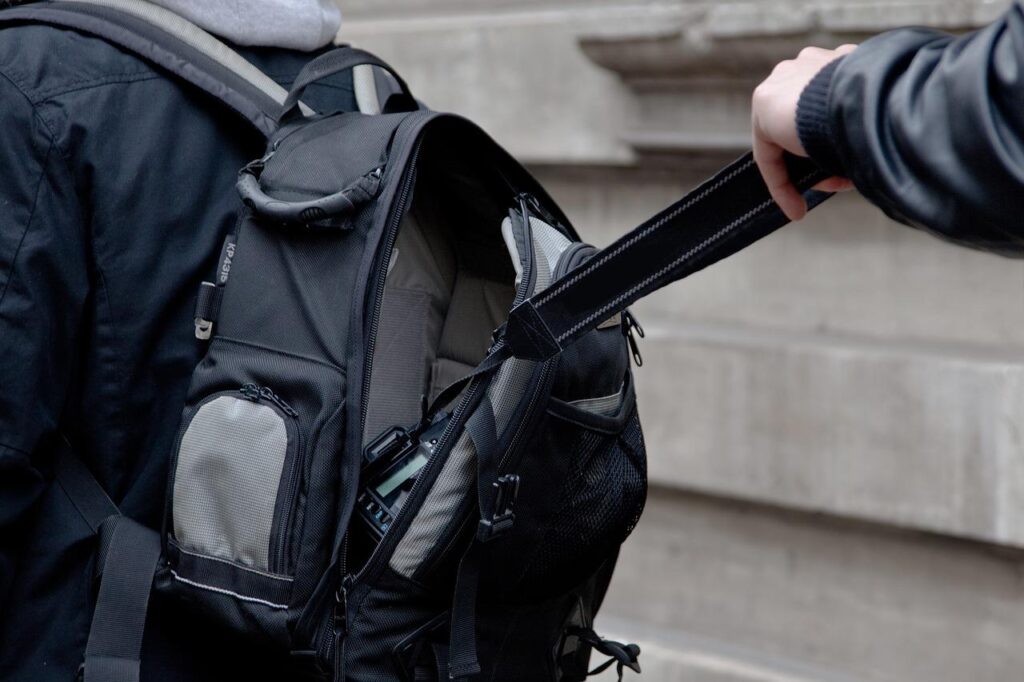The Traffic Ticket Point System North Carolina possesses a method for the penalization of traffic…
Grand larceny charges in North Carolina are serious offenses that can carry stiff penalties. Depending on the severity of the charge, you can face jail time and hundreds of dollars in fines. If you are facing a larceny charge in North Carolina, a criminal defense attorney can help you better understand the case against you.
But not all larceny charges are on equal footing. Some crimes are considered misdemeanors and others fall under the larceny category.
We're going to examine what crimes can constitute grand larceny in North Carolina and what crimes are misdemeanors. We'll also take a closer look at the penalties you can expect to face for these crimes and how a defense attorney can help your case.

What Is Grand Larceny In NC?
Larceny is the act of taking items that don't belong to you. When you're talking about grand larceny in NC, the state distinguishes between petty larceny and grand larceny.
The theft of anything valued under $1,000 is described as petty larceny while anything over $1,000 is considered grand larceny.
Offenses can be classified as misdemeanors or felony crimes. Here's the breakdown:
Misdemeanor Larceny
You can be charged with misdemeanor larceny if you take someone's property without their permission, knowing the property doesn't belong to you. The value of the property must be $1,000 or less.
Felony Larceny
Felony larceny is similar to misdemeanor larceny, but the property taken must have a value of over $1,000. The theft must also meet other specific requirements such as a robbery of a person, burglary, or the theft of an explosive device or firearm.
Misdemeanor Possession Of Stolen Goods
If the person knew that the goods were stolen, they can be charged with this misdemeanor crime. The value of the property must be under $1,000.
Felony Possession Of Stolen Goods
The distinction between a misdemeanor and felony charge is the same as for larceny. Felony possession of stolen goods requires that the value of the goods or property involved is over $1,000 or that the theft meets the same requirements for felony larceny.
If multiple items are taken during one theft, their cumulative value can be added up and may result in a felony larceny charge if the property totals more than $1,000.
Under North Carolina General Statute §14-72, you can be charged with felony larceny if the property you allegedly stole is worth more than the given value or is a specific type of item.
Larceny Is Classified As A Felony If:
- The amount of goods stolen is worth more than $1,000
- The property theft is related to a burglary
- Receiving or possessing stolen goods that are valued at more than $1,000 while knowing or believing they are stolen
- Firearms or explosive devices are taken
- Theft of property happens when a person has been convicted of theft at least four other times
- North Carolina State Archives is involved
What Property Is Considered Larceny According To North Carolina Law?
Some examples of stolen property that are considered larceny according to North Carolina law include:
- Taking merchandise in a store (shoplifting)
- Removing a shopping cart from a store
- Taking gasoline from a gas station
- Taking motor vehicle parts
Remember, if the value of the items stolen is worth more than $1,000, it will be considered grand larceny.
What Are Considered Theft Crimes?
Theft crimes can cover a multitude of items. Under general theft cases, any person who takes or receives what does not belong to them may face theft charges.
Taking any of the following can be considered a theft crime:
- Merchandise from a store
- A vehicle, motor craft, or aircraft
- Animals
- Fuel
- Firearms or explosive devices
The value of what was taken will determine whether it is a misdemeanor or felony larceny charge.

What Is The Punishment For Larceny In North Carolina?
The punishment for larceny crimes in North Carolina is broken down like this:
Class H Felony Larceny NC
Under Carolina law, larcenies are considered Class H felonies unless a statute specifically defines the crime as a misdemeanor or other type of felony. Misdemeanor larceny charges are typically referred to as "petty misdemeanors". Criminal penalties for a Class H felony generally include 4-24 months in prison. Offenders typically serve 5-6 months in jail.
Larceny will always be considered a felony regardless of the value of the property stolen if:
- The property was taken from another person
- The theft was committed by breaking and entering
- The stolen property was a firearm, explosive device
Habitual Larceny Sentencing
Habitual larceny is a Class H felony and is applicable when the defendant has four prior larceny convictions. The convictions can be either felony, misdemeanors, or any combination of the two. Punishment will fall under the other Class H felonies.
How Can Being Convicted of a Felony Impact My Life?
Besides facing prison time and fines, being convicted of a felony can also hinder your ability to:
- Rent a home
- Obtain child custody
- Get hired or keep your job
- Get accepted into college
- Get a loan
- Obtain some professional licenses
Misdemeanor Larceny Punishment
- Class 3 and Class 2 misdemeanors
A first-offense shoplifting charge is a Class 3 misdemeanor. This carries a maximum penalty of 30 days in jail and a $200 fine. A second offense within 3 years is a Class 2 misdemeanor with a possible sentence of 60 days in jail and a $1,000 fine.
- Class 1 misdemeanor If a person is convicted of misdemeanor larceny, it is classified as a Class 1 misdemeanor. The maximum penalty is 120 days in jail. The judge will decide the appropriate fine.
Conspiracy To Commit Larceny In North Carolina
A conspiracy is when two or more people agree to commit a crime. To prove conspiracy, two people must come to an agreement to commit a criminal offense. Also, at the time of the agreement, the conspirators must have intended to commit the crime.
When people conspire to commit larceny in North Carolina and are convicted, they are found guilty of a felony that is one class lower than the felony they conspired to commit.
How Can A Criminal Defense Lawyer Help Beat A Theft Crime?
If you are facing a larceny charge in North Carolina, a criminal defense attorney can help you better understand the case against you. At the Law Offices of J.M. Kotzker, you can receive expert services from a law firm of professionals who have handled cases like yours.
Contact us today at (919) 439-5104 or reach out to us online so that we can find out more about your case and give you the legal help you deserve.
